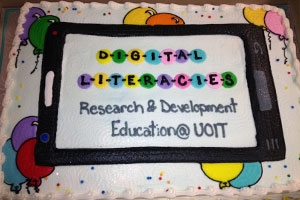UOIT Faculty of Education launches Digital Literacies Research and Development Lab
September 11, 2013

The University of Ontario Institute of Technology's (UOIT) Faculty of Education recently opened a facility that will help researchers committed to community outreach and equity explore the ways individuals and groups use digital technologies to address issues of social justice.
The Digital Literacies Research and Development (DLRD) Lab is dedicated to researching a variety of social practices people engage in while using digital technologies to connect with each other, communicate their ideas, design and create digital texts of all kinds. Located in the Education Building at UOIT's downtown location, the DLRD Lab features two class sets of tablets - both iPads and Android devices - as well as teleconferencing equipment for virtual collaboration and communication.
The lab's four main areas of focus include:
- Connections - cultural and intercultural, personal, social media networking and the participatory culture.
- Redesigning/remixing - taking images, music, song lyrics, personal photos and snippets of media from different sources and repackaging it as a new product.
- Information - searching, tagging and critically examining the validity of information.
- Language - texting, using hypertext, print, multimedia, tech and coding, gaming and mobile learning.
Researchers in the lab are also committed to innovative and creative forms of research dissemination using social media and different kinds of digital tools. The lab offers instructional support and research distribution through a series of workshops, institutes and presentations that are open to the research community, the educational community and the general public.
The DLRD Lab is also an important tool for enabling outreach for students, teachers and community members in the Durham Region. For example, the Faculty of Education recently partnered with the Durham District School Board to work with two elementary schools within walking distance of the faculty.
"We will be leveraging the resources in the DLRD Lab to provide disadvantaged students access to the latest technologies and opportunities to use digital tools of all kinds," said Dr. Janette Hughes, Associate Professor and Assistant Dean, Research in the Faculty of Education.
In addition to providing school faculty with professional development opportunities in the forms of workshops and one-on-one support, the DLRD Lab will also be used to host parent information sessions. A web-based resource will be available to enable strong home-school-community connection and communication.



